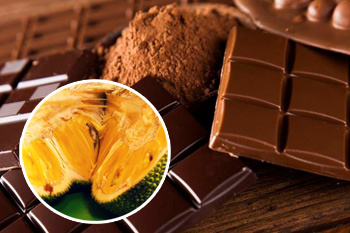Apr 25: Jackfruit seeds produce chocolaty aromas and could be a potentially cheap, abundant substitute for making chocolates, say scientists in the light of the looming global cocoa bean shortage.
 Researchers from University of Sao Paulo in Brazil found that compounds found in jackfruit seeds produce many of the same aromas as processed cocoa beans and are a potentially cheap, abundant substitute for use in chocolate manufacturing.
Researchers from University of Sao Paulo in Brazil found that compounds found in jackfruit seeds produce many of the same aromas as processed cocoa beans and are a potentially cheap, abundant substitute for use in chocolate manufacturing.
Globally, farmers produce about 3.7 million tonnes of cocoa annually.
This yield is not expected to increase significantly in the next decade, but estimates suggest that worldwide demand for these beans will grow to 4.5 million tonnes by 2020 researchers said.
Scientists are investigating alternative sources that can mimic chocolates distinct aroma and flavour.
Researchers made 27 different roasted jackfruit seed flours by acidifying or fermenting the seeds prior to drying.
They roasted these flours for various times and temperatures using processes similar to those used to enhance the chocolaty flavor of cocoa beans.
Using gas chromatography-mass spectrometry, the team identified several compounds from the jackfruit flours that are associated with chocolate aromas.
The chocolate aroma of groups of four flours were ranked by a sensory panel and response surface methodology was used to identify optimum conditions.
They asked volunteers to smell the jack fruit seed flours and describe the aromas.
The team found that in contrast to the acidified flours, the fermented ones were described as having more positive attributes, such as caramel, hazelnut or fruity aromas, researchers said.
Researchers concluded that jackfruit seeds are capable of producing chocolate aromas and are a potential replacement for the aroma of cocoa powder or chocolate.
The study was published in the Journal of Agricultural and Food Chemistry.




Comments
Add new comment